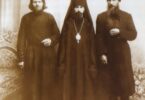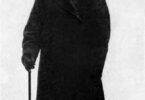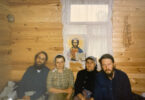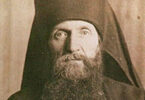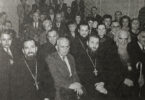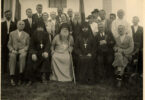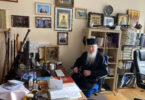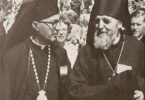Metropolitan Panteleimon was placed under arrest in a former women’s monastery in Lyady. He was there until winter, when the German occupation forces moved him to Vileyka, where he was held by German Military Police. Archbishop Filofei quickly demonstrated that Metropolitan Panteleimon”s suspicions had been misplaced. The Byelorussian nationalists immediately came to him with demands to dismiss some clergy, bring others to Minsk, ordain their candidates … he conceded only by appointing one priest they requested, Father N. Lapitsky. He absolutely refused all the other demands, stating that only the Metropolitan could approve the requests. The nationalists then decided that Archbishop Filofei should also leave Minsk, and a more pliable Bishop appointed to head the Church. This further step at complete control of the Church was soon discovered to be outside of their means. Complaints to the Germans, and further orders resulted in only further refusals from Archbishop Filofei. He stated that it was necessary to call a Church Council, and that only the Metropolitan could do so. The Germans allowed permission for the Council, but Metropolitan Panteleimon refused to participate, saying that he had authorized Archbishop Filofei to direct Church affairs. This became the method of handling the civil authority-Archbishop Filofei claimed no authority to enact the orders, citing the Metropolitan’s position as head of the Church, or canonical regulations, and Metropolitan Panteleimon would state that he had authorized Archbishop Filofei to direct the Church. It was exasperating for both the Byelorussian nationalists and the Germans, but according to the statute they themselves had signed, perfectly correct. [1]op. cit. 56 The German Occupation Authority in Byelorussia showed how they differed in their treatment of representatives of the Church from the bolsheviks. They didn’t simply shoot all those who refused to do their bidding …
Archbishop Filofei (Narko), Bishop Afanassy (Martos) and Bishop Stefan (Sevbo) presided over the Byelorussian Church Council of 1942, held in Minsk. Metropolitan Panteleimon refused to participate, and as well, the Germans would not allow him to. Archbishop Venedikt’s (Bobkovsky) Diocese, having been annexed to East Prussia by the Germans, stated that he was under the jurisdiction of the Berlin & Central European Diocese of ROCOR, and had no concern with Church business in Byelorussia. Metropolitan Panteleimon authorized Archbishop Filofei to convene and preside at the Council, which both understood had to be held due to the orders of the Occupation Authority. [2]op. cit. 56
The Byelorussian nationalists attempted to have all “their people” voted in as delegates, but were unsuccessful. By the time the Council was to convene, only the Minsk (which sent 68 delegates) and Novogrudok (which sent 39 delegates) Dioceses had elected delegates. The opening of the Council was delayed due to the Bishops petitioning that Metropolitan Panteleimon be released from arrest and be able to participate in the Council. A delegation of clergy visited the Metropolitan, who again sent a letter authorizing Archbishop Filofei to proceed. On 30 Aug 1942, the Council finally opened after the serving of a Moleben. There were two items on the agenda: declaration of Autocephaly, and acceptance of the Statute of the Church. There were discussions about the preparation of letters to all the Autocephalous Orthodox Churches requesting approval of Byelorussian Autocephaly. The Statute, “Svyatoy Pravaslaўnay Belarusian Aўtakefalnay Tsarkvy,” was approved (The entirety of which can be seen in Kasiak, I.: Z Gistori Pravaslavnai Tsarkvi Belaruskaga Narodu) . Statute Number 113 read: “The canonical autocephaly announcement will follow after the recognition of all the autocephalous Orthodox Churches.” The Byelorussian Church Council ended on 2 Sep 1942, without any official pronouncement on Autocephaly. [3]op. cit. 56
Six months after the Council, the Byelorussian nationalists discovered that the letters to the Autocephalous Churches concerning the Autocephaly of the Byelorussian Church had not been sent. They immediately complained to the Germans, who complained to Archbishop Filofei. He explained that according to the Church Statute adopted at the Council, only Metropolitan Panteleimon could sign the letters; since he was imprisoned, he could not sign. In a Synod meeting, which only Archbishop Filofei and Bishop Afanassii attended, an appeal to release Metropolitan Panteleimon was composed and sent to the Germans. On 16 April 1943, Vladika Metropolitan Panteleimon was brought to Minsk, and settled into the Metropolitan’s residence. A Synod meeting ensued, chaired by Metropolitan Panteleimon. He knew that the delivery of letters to the Autocephalous Churches during wartime was uncertain, at the least. He therefore signed the letters, and they were given to the German Occupation authorities, and “Their subsequent fate is unknown.” It was also noted that the Council, due to the absence of delegates from all the Dioceses, could not be termed as an “All Byelorussian Council.” [4]op. cit. 56
In the beginning of May 1943, Bishop Stefan (Sevbo) asked Metropolitan Panteleimon to approve the consecration of a Vicar Bishop for his Diocese of Smolensk. The Metropolitan asked for the approval of all the Bishops; Archbishop Venedikt and Bishop Afanassy replied that they did not know the candidate, Archimandrite Pavel (Meletiev, 1880-1962), and asked that Metropolitan Panteleimon and Archbishop Filofei make the decision. They agreed to the consecrate Archimandrite Pavel as Bishop of Roslavl, Vicar of the Smolensk Diocese. The consecration took place in the Transfiguration Cathedral in Minsk, concelebrated by Metropolitan Panteleimon and Archbishop Filofei. It turned out that the newly consecrated Bishop Pavel was not satisfied with either hit title or his position, as he had not wanted to be a Vicar Bishop, but Bishop of Bryansk. After the consecration, he simply remained living in Bryansk. “It soon became clear he was the wrong candidate for the episcopate.” The Byelorussian nationalists were outraged as the new Bishop Pavel was Russian, not Byelorussian. The Germans paid no attention. In the emigration after the War, Bishop Pavel joined the Roman Catholic Church, accepted as a Bishop of the Uniate “Russian Catholic Church.” [5]p. cit. 56

